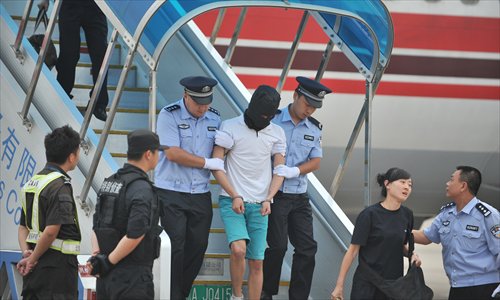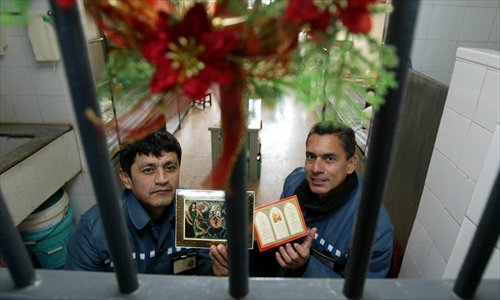HOME >> CHINA
Swapping prisoners
Source:Global Times Published: 2014-3-9 19:53:01

Police escort Chinese a suspect involved in telecommunications fraud from an airplane arriving at the Beijing Capital International Airport, which set off from Jakarta, Indonesia, on July 31, 2013. Photo: IC

Two foreign inmates display Christmas cards sent by their relatives on Christmas at a prison in Shanghai in 2005. Photo: IC
As the number of foreigners serving sentences in China and the number of corrupt officials fleeing overseas are both increasing, there is growing need for a system that could facilitate the transfer of prisoners to their home countries. But things are moving slowly due to a lack of related laws.
Late last year China's legislative body approved an agreement on international transfers of sentenced people between China and Kyrgyzstan.
So far China has signed bilateral agreements with 11 countries regarding the international transfer of prisoners, including neighboring countries such as Mongolia, Kazakhstan and Russia, as well as other countries such as Spain and Australia. Negotiations with Japan are still ongoing.
There are over 20 other countries that have approached China to establish agreements on prisoner transfers, according to the Ministry of Justice.
Although China hasn't signed formal agreements with many countries, China is willing to work on a case by case basis to transfer prisoners with other countries, said Guo Jian'an, director of the Department of Judicial Assistance and Foreign Affairs, under the Ministry of Justice.
Before China signed the agreement with Kyrgyzstan, Khikhizov Sharip, a Kyrgyzstan citizen sentenced to 15 years imprisonment in Xinjiang Uyghur Autonomous Region on charges of selling endangered wildlife products, was transferred to Kyrgyzstan in 2010 upon the request of Sharip and Kyrgyzstan authorities.
International laws
There are two UN conventions or agreements that provide a framework for countries to collaborate on international transfers of sentenced people.
According to international conventions, the prisoner has to give consent, and his or her actions should constitute a crime in both countries, and the prisoner shouldn't be sentenced twice for the same offence.
In 1993, China handed over a convicted Romanian serving in a Chinese prison back to Romania, in what was the first case of its kind. In 1997 two Ukrainians who were sentenced for robbery were transferred to Ukraine.
By early 2012, the Ministry of Justice had received 198 cases, including requests from foreign countries as well as from within China on prisoner transfer. Among them, 107 cases were related to South Korea, 32 were related to Iran, and 20 to Russia, official numbers show.
In December 2010, a French man serving 11 years for intentional injury in Guangdong was transferred to the French authorities. It was the first time that such processes were openly reported.
Two South Koreans who were serving in Shenyang, Liaoning Province, on drug-related charges were transferred to South Korea on November 15 last year. There were 322 South Koreans prisoned in China, according to Yonhap News Agency of South Korea.
Guo said that so far China has transferred over 40 foreigners serving sentences in China back to their home countries. On average, about 10 people are transferred each year, he said.
Management problems
"There are over 6,000 foreign inmates serving sentences in China's prisons, causing a lot of pressure to management," said Guo.
Collaborating with other countries on transferring prisoners could help alleviate such pressure, and help the countries to better protect their citizens, he said, according to official information from the National People's Congress.
But despite more and more contact with foreign countries on transferring prisoners, the mainland has yet to sign any agreements with Hong Kong, Macao or Taiwan.
Transferring prisoners back to their home countries could save the authorities some trouble and cost, as it usually costs a lot more to manage a foreign inmate than a Chinese one.
Language and healthcare were the two biggest problems facing the management of foreign inmates, according to a report by the Ministry of Justice in 2008.
The same report says that Yancheng Prison in Hebei Province spent over 40,000 yuan ($6,528) on translation for its foreign inmates in 2007. In the same year, the prison spent over 70,000 yuan in six months on an inmate who was being treated for uremia.
Dongguan Prison, located on the city's Xinzhou Island, Shijie village, Guangdong Province, received its first foreign inmate in 1996.
Of the approximately 5,000 inmates there, close to 500 were foreigners from 52 countries, according to a report by the Shenzhen-based Daily Sunshine in July last year.
Since 2007 there has been an increasing number of prisoners from African and Middle Eastern countries, most of whom were sent there on drug-related crimes, according to a report in the Southern Weekly in 2011.
The staff have remained fairly stable but only a few of them understand English.
In order to communicate with a foreign inmate who doesn't speak English, the wardens need two interpreters who translate between the inmate's mother tongue, English and Chinese. It's time consuming and risks miscommunication, the paper reported.
Other aspects of daily life, such as hygiene habits or diet, can also be troublesome for the management of the prisons.
Officials at Dongguan Prison said they have to maintain a balance between equality and appropriate caution. Foreign inmates earn more than Chinese inmates for their compulsory labor work in prison, and foreigners usually get a lighter workload and get better food than Chinese inmates, according to the Southern Weekly.
The authorities have to invest more manpower and money into managing foreign prisoners, and have to handle foreign prisoners with extra caution for fear of causing diplomatic problems.
Many foreign inmates have a hard time understanding mandatory labor while imprisoned and some argue that it wasn't part of the punishment as written in the verdict, according to the paper.
Lack of policies
There isn't a regulation on how to manage foreigners serving time in China.
The Prison Law, revised in October 2010, has no mention of foreign prisoners. The only regulation seems to be a guideline on meeting with foreign inmates back in 2003.
For China, international transfers could be an important part of fighting corruption, as many corrupt officials flee overseas to evade punishment. There were at least 54 corrupt officials who fled overseas between 1992 and 2012. These are just the cases that were publicly reported.
China has signed extradition agreements with 36 countries, official numbers show, and it has judicial cooperation agreements with dozens of other countries.
The mainland didn't start requesting to have Chinese inmates transferred back to China until 2012.
At the time, about 13 Chinese inmates serving time overseas in places including Russia, Ukraine and South Korea, had applied to come back to China and the cases were being processed, according to official reports in February 2012. There have not been any updates since then.
In 2001, three Chinese people who had previously worked as heads of a bank branch were found to have embezzled over 480 million dollars from the bank. By the time it was discovered, the three had fled to the US and Canada, which China hasn't signed extradition agreement with.
After years negotiation, Yu Zhendong, one of the three bankers, made a deal with the authorities. He agreed to come back, provided that his wife and son stayed in the US.
In 2004, after being sentenced to 12 years imprisonment in a US court, Yu was transferred to China, where his sentence was confirmed to be 12 years, according to media reports.
The other two bankers refused to come back. They were sentenced to over 20 years imprisonment in May 2009 at a local court in Las Vegas.
In another case, Lai Changxing, the kingpin of a notorious smuggling racket in the 1990s, was deported to Beijing in July 2011 from Vancouver after 12 years of negotiations between Chinese and Canadian authorities. In May 2012, Lai was sentenced to life imprisonment.
According to media reports, most of the people involved in extradition or international transfers are corrupt officials or suspects of serious economic crimes.
The lack of legislation is a major obstacle, officials and legal experts say. The mainland and many countries and regions do not recognize each other's judicial systems, and some domestic laws and regulations have conflicts with international agreements, making it difficult to determine the crime and sentences of a criminal.
"The top priority now is to establish a system and mechanism for international criminal justice cooperation that fit China's situation as well as international agreements and principles," said Guo Jian'an, director of Department of Judicial Assistance and Foreign Affairs under the Ministry of Justice.
A law on international criminal justice assistance has been drafted and discussed but has not begun to be processed.
Global Times
Posted in: In-Depth